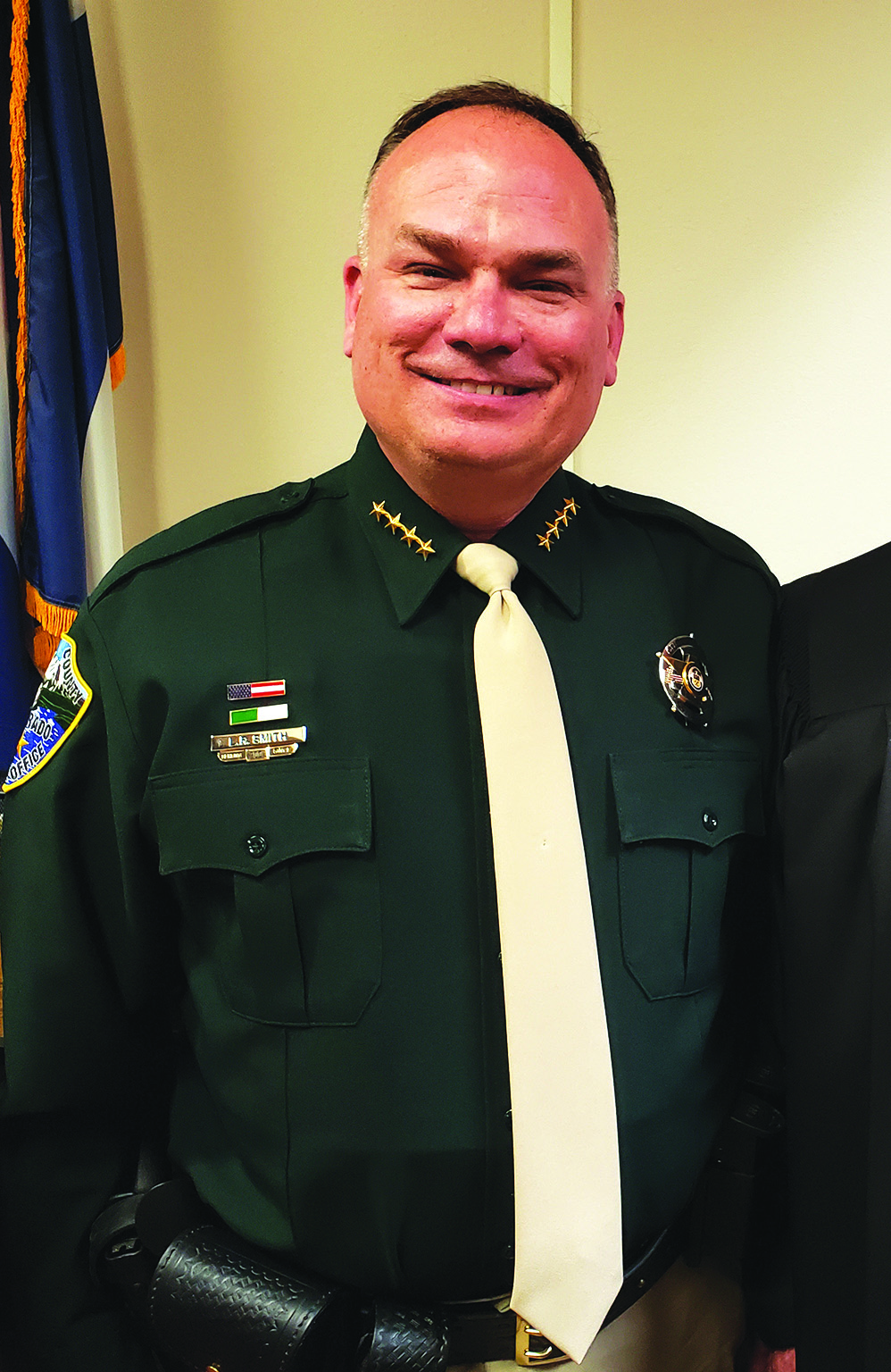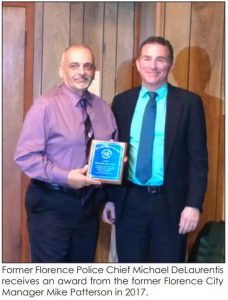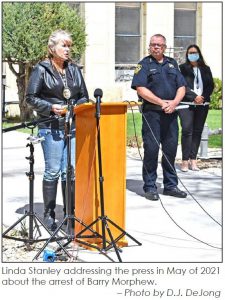Sheriff Lloyd “Rich” Smith recently took office in Custer County and sat down for a Q&A with the Tribune in February 2023. This interview has been edited for length and clarity.
Q: Let’s start with the basics – what’s your background, and how did you find Custer County?
A: I was born in Stuttgart, Germany, and brought up in Colorado Springs – my dad was in the Air Force. I graduated high school in Oklahoma City. I watched shows like CHiPs and wanted to be an emergency responder. I went to EMT school and became an EMT, volunteered with Red Cross, and was part of the rescue effort in the [1995] Oklahoma City bombing. That was when I decided I didn’t want to be an emergency responder and I wanted to be an emergency preventer. I had a corporate job and took emergency management classes through the Red Cross to learn business resilience strategies. On September 11, 2001, I decided to become a cop. I began the process of applying to be a Colorado State Trooper. I joined the state patrol and went to the police academy in 2002.

Q: Were you a Colorado state trooper after that?
A: Yes. I spent three years in Summit County, then transferred to the Department of Homeland Security. I was doing emergency management for them. I became involved in Critical Infrastructure Protection. I have visited every dam in Colorado! I was part of a four-man team to improve security, with an emphasis on business continuity – how would you come back after an emergency? While I was with that team, the Bailey shooting happened [at Platte Canyon High School in 2006]. We developed a program where we taught schools protection techniques. I was promoted to Sergeant in Colorado Springs, which brought me back to criminal investigation. I bought my first motorcycle in 2013, and a trooper friend told me about Westcliffe, so I started driving up here and spending time here. In 2016, I was going to be promoted to Captain, so I applied to be Captain of this area. I was in charge of Park, Chaffee, Lake, and Custer Counties. I had no intention of running for Sheriff because it involved politics.
Q: So what happened to change your mind?
A: I was eligible to retire. I had planned to do five more years [with the State Patrol], but then a friend asked me to run. I grew to love the people and community here in Custer County and wanted to serve as Sheriff.

Q: What’s your philosophy on law enforcement?
A: Faciens optimum est in civitatem, or “Doing what is best for the community.” There are four points to it: To protect life and property and preserve our small-town values; recruit, retain, and develop the best team members; creatively work with the community to solve problems and prevent crime; and build and nurture new partnerships with new stakeholders to achieve our mission. There are also four ideals I strive for: Integrity, Courage, Compassion, and Creativity. When I leave here, I want deputies trained to the max, and I want to develop new [community] stakeholders.
Q: What did you find when you got here?
A: For one thing, an unusually high number of mental health calls [to the Sheriff’s Department].
Q: How do you plan to respond to that?
A: I’ve had experience with mental health aid training. There was a case in Manitou Springs with a man named John Hayward. That guy had been laying down red flags his whole career – he was a police officer and had a bad domestic violence case in 1997 in which he had to shoot a suspect who pulled a gun on him from the back of a patrol car. He was suffering badly from PTSD, which is a thing that can happen to law enforcement officers, first responders, and firefighters. [After the Hayward case] I ran a peer support team with 80 trained responders. I picked an amazing counselor. Here, I plan to work with SolVista and EMS to get people trained to handle mental health calls. We are working on grants coming from the state for mental health aid.

Q: You mentioned “new stakeholders.” Can you give us some examples?
A: The Custer County Sheriff’s Department goes back to 1878. Partly to commemorate that heritage, I want to bring back the mounted posse. I’d like to partner with the Custer County Tourism Board to have the mounted posse for police work at events. The horses help to humanize things. One of the things that keeps me up at night is [the possibility of] a mass casualty event. I talked to Steph [Giebeig] at EMS and [Former Director] Adrian Washington at OEM. I got a Homeland Security grant to get trauma kits. All staff has had training now in using bag valve masks (BVMs) for blocked airways. We can use it on children and adults, but not on infants. Often we beat the EMS to heart attack calls. Now we can hook up to BVMs [and administer aid]. Every person on my team has that advanced training. There had not been an active shooter training in three years, so we just did two – we brought in the Forest Service and other partners for that. We have 30 people trained to render first aid during a mass casualty event.
Q: Were you part of the decision to shut down the county jail?
A: I was. I’ve learned good business models to use for taxpayer money. I talked to a bunch of other sheriffs in other counties. We were paying $900 a day to run the jail, so we are contracted with Fremont County [for jail services], and we are paying $120 a day to them.
Q: What is happening with jail staff?
A: Some have been sent to Police Academy for further training, and one has been sent to courthouse security to replace Mike Halpin, who was appointed to judge. I have two sergeants now; one promoted, one brought from outside. We still have detention deputies because we have two detention cells still. The two things you have to be [in detention] here for are trials and sentencing. If we arrest a person [at night], we take them in and keep them there [in the jail] overnight. The detention deputies can drive them down [to Fremont County].
Q: Has workforce housing been an issue for your deputies?
A: Oh, yes, and salaries too. We had zero applicants for jobs [when I was elected]. I did a salary survey and asked the county for a 25% raise to get salaries more in line. We started getting more applicants, and now we are almost fully staffed.

Q: There has been a lot of debate about Colorado’s Extreme Risk Protection Orders, or “red flag law” [that allows law enforcement to confiscate firearms under certain conditions]. The previous Sheriff came out against it, and you have spoken against it during your campaign. Why the resistance among law enforcement officers to the “red flag law?”
A: I have a couple of problems with the way it was written: 1. Even a criminal has a right to confront their accuser. I file a paper with the court, and you don’t know about it till it happens – that may not be a bad thing tactically, but… 2. You have a limited time to appeal that decision – you have to get a gun lawyer to come down and defend you, and you only have one shot. You can lose your gun rights for a year.
Q: Final thoughts?
A: If you ask me what else keeps me up at night, it’s wildfire. I met with the Forest Service two weeks ago and asked what areas we need to worry about – Rosita and the Wet Mountains are both big risk areas. If I could change one thing right away, it would be to get everyone in the county to sign up for the Everbridge (reverse 911) program. (Editor’s note: Details on how to sign up for the program can be found on the Custer County Government’s website at https://www.custercounty-co.gov/.)
– Elliot Jackson






